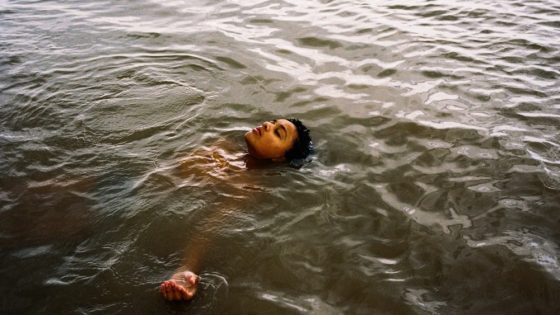Eight years ago, the writer-director Andrea Arnold packed up her hand-held-camera brand of kitchen-sink British austerity and took it across the pond to make “American Honey,” a movie about a wolf pack of kids in a van who seemed to incarnate the tumult of the 21st century. The movie, crafted in a style that I thought of as hip-hop Dardenne brothers, was an indie explosion that felt like a landmark. Now, though, in “Bird,” the first dramatic feature that Arnold has made since (in between, she directed episodes of “Big Little Lies” and “Transparent” and made the documentary “Cow”), she’s back to chronicling the miserablism of aimless, scroungy British young folk who experience their lives as a dead zone. Forgive me if I wish she hadn’t left the party so soon.
For years, Arnold has been a Cannes darling, and a critics’ darling too. So I expect to be out of the loop when I say that “Bird,” which premiered at Cannes today, doesn’t fully cut it as a movie. It certainly has Arnold’s empathy and integrity, as well as her raw-boned craftsmanship. It also has a couple of charismatic rising movie stars in key roles.
Barry Keoghan, who now carries himself differently as an actor (he gives off the awareness that he’s a star), plays Bug, a single father of two who lives in a squatter’s flat in Kent and spends exactly no time looking after his children. What Bug has devoted too much time to is getting tattoos. His pale upper body is a menagerie of inked creatures: a fly, a spider, and — starting on the right side of his face — a huge intricate centipede that snakes down and around his neck. But Bug’s children just bug him.
One of them is the film’s heroine, Bailey (Nykiya Adams), who is 12 but seems older. That’s part of her wise-beyond-her-years quality, but it’s also that she’s sullen and hardened, locked in her silent appraising stare. Bailey’s mother lives in another part of town, above a drug den, with a boyfriend who is (natch) a psychotically angry abuser. Arnold, doing her indie-rock Dardenne thing, gives us scenes of the camera following Bailey, tracking her movements over a wire-mesh bridge, and in that very tracking capturing what makes her a wayward soul. The film also spotlights Bailey’s cell-phone videos, mostly footage of birds that she projects onto her wall.
Bailey’s head is topped with braids, but early on, in a fit of annoyance, she lops them off, which makes her look that much more stoic and forlorn. I should add that Bailey’s half-brother, Hunter (Jason Buda), belongs to a shambles of a vigilante youth gang who like to put on creepy masks and terrorize locals who have bad reputations. The punishments meted out by this junior “Clockwork Orange” brigade (“Slice him!” says one of the gang) are arguably worse than the crimes.
There’s a place in the world, and sometimes a vital one, for a movie like “Bird,” which recalls the spirit of early Arnold films like “Fish Tank.” But it’s my feeling that Arnold, at this point, isn’t just making a coming-of-age drama of lost lives — she’s mainlining neorealist glumness. Keoghan’s performance is a bit of a showboat stunt (he’s supposed to be a terrible father but doesn’t seem like a father at all). And though Bug, it turns out, is about to marry his flame of three months (he will finance the wedding by selling a toad’s slime for its hallucinogenic properties), Bailey’s defiant hostility to this plan feels overstated. She’s 12, but she won’t even agree to put on a purple catsuit and be a bridesmaid. That’s “independence” taken to an unreal degree of precosity.
Wandering in a field, Bailey runs into a strange man who is wearing a skirt and a look of damaged sensitivity. His name is Bird, and he’s played by Franz Rogowski, the German actor whose performance as the prima donna filmmaker in Ira Sachs’ “Passages” made him into such a sociopath that he threw the movie out of whack. As a character, Bird hails from the opposite end of the emotional spectrum. He’s sweet and kind, he looks like a crushed-velvet version of Joaquin Phoenix crossed with Klaus Kinski, and everything about him is delicate. Bailey and Bird become friends, not because of any magical overlap in temperament, but because that’s the film’s high-concept premise. Bailey helps Bird to locate his biological father (who wants nothing to do with him). And he helps her by…well, let’s just say that he lives up to his name.
A gritty story of emotional poverty crossed with a fantasy-pal fairy tale? “Bird” will please Andrea Arnold obsessives, but apart from that I’m not sure there’s much of an audience for it. The film is Arnold trying to have the integrity of her severity and eat it too. “Bird” is a feel-bad movie that turns into a feel-good movie. What it never feels like is a totally authentic movie.
Source Agencies




